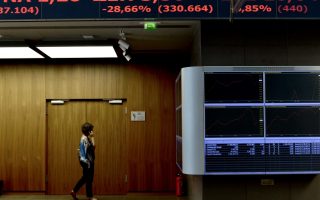Coronavirus worries ripple across southern European bond markets

Southern Europe’s bond markets succumbed to selling pressure on Tuesday as concern that Italy may not be alone in combating the coronavirus outbreak gripped markets.
The coronavirus death toll climbed to seven in Italy on Monday and several Middle East countries were dealing with their first infections, sending markets into a tailspin on Monday.
A calmer tone emerged in early trade on Tuesday, but it soon gave way to fresh selling of not just Italian bonds but also Greek, Spanish and Portuguese debt.
Italian authorities on Tuesday reported a woman had tested positive for coronavirus in Sicily, the first case south of Rome.
“What’s different today is that we are seeing more of a peripheral bond selloff,” said Lyn Graham-Taylor, a rates strategist at Rabobank in London.
“Coronavirus is not an Italy-specific problem, but it could become a more global problem so that is what people are starting to price in.”
Italy’s 10-year bond yield rose more than 4 basis points to 1.02%, its highest level in almost a month. It rose 6 bps on Monday in its biggest one-day rise in over two months as Italy grappled with the worst flare up of the virus in Europe.
In a sign of increased risk aversion, investors plumped for the safety of top-rated German government bonds – pushing the 10-year Bund yield to its lowest since early October at -0.51 percent.
This in turn saw the gap between German Bund yields and their peripheral peers widen. The Italian/German 10-year bond yield gap was at its widest in a month at around 152 bps.
Spain’s 10-year bond yield spread over Germany widened to 73 bps — the widest in more than two months. And the Portuguese yield gap was also at its widest in over two months at almost 69 bps.
Greek bonds also came under selling pressure, with 10-year yields last up almost 8 bps at 1.08 percent. They fell below 1% for the first time just two weeks ago.
Investors, bracing for the coronavirus outbreak to hit the world economy, have pushed up expectations for rate cuts from the US Federal Reserve and European Central Bank.
Futures for the Federal Reserve funds rate have surged in the last few days to price in a 50-50 chance of a quarter-point rate cut as early as April.
Euro zone money markets attach a more than 60 percent chance of a 10 bps rate cut by the ECB by July, up from around 35 percent a week ago.
“Pricing for some future action is fair, but that rate cuts of this magnitude, at this level, are not likely to have any effect, beyond giving the appearance that the ECB is paying attention to the potential hit to growth and acting in the only way they can,” said Tim Graf, chief macro strategist at State Street Global Advisors in London.
Elsewhere, Spain starting selling a new 30-year bond, which saw strong interest, according a lead manager.
[Reuters]





